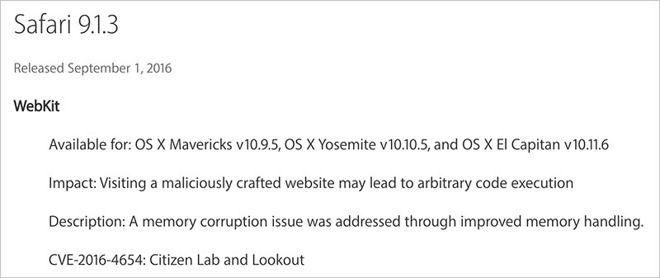Apple in a patch last week blocked a particularly nasty malware package called "Pegasus" from infiltrating iOS devices, and the company is now doing the same for its OS X desktop operating system.

Apple on Thursday issued security updates for OS X 10.10 Yosemite, OS X 10.11 El Capitan and Safari to address a vulnerability that potentially allows nefarious agents to take over a target device with a single click.
Dubbed "Pegasus," the assault package leverages three zero-day vulnerabilities to remotely jailbreak and install a suite of monitoring software onto a victim's device. One of the key tools in the process is an exploit that takes advantage of a memory corruption flaw in Safari WebKit. The vulnerability allows attackers to deliver the malware payload when a target clicks on a link leading to a malicious webpage.
Once installed, Pegasus exploits kernel flaws to upgrade privileges, allowing attackers to intercept text messages, pilfer emails, access contacts and steal information from a variety of third-party apps including Gmail, Facebook, Skype, WhatsApp, WeChat and more.
Apple patched the vulnerability last week when it released iOS 9.3.5.
It appears the same WebKit and kernel vulnerabilities that enable Pegasus to effectively infiltrate iOS devices also exist in OS X. To combat potential exposure, Apple issued a combined security update for OS X Yosemite and El Capitan, as well as a standalone fix for the Safari web browser. The combined OS X update includes the Safari patch.
Pegasus was discovered by Citizen Lab and Lookout after a human rights activist was sent a link leading to a malicious webpage bearing the jailbreak and remote monitoring tools. An investigation into the malware revealed NSO, an Israeli-based organization owned by U.S. company Francisco Partners Management, likely crafted Pegasus to further its "cyber war" line of products.
Mac users are urged to download the security updates via the Mac App Store.


